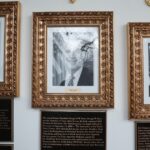
Courts in England are debating whether to stop requiring wigs as part of the dress code for barristers.
The discussions come after complaints from several black barristers who alleged that the archaic piece of dress code for the country’s lawyers is discriminatory against those with Afro-Carribean hair, the U.K. Telegraph reported.
“Following questions from barristers about wigs and hair discrimination, the Bar Council set up a working group to consider court dress in the context of all protected characteristics,” a Bar Council spokesman told The Telegraph.
“The findings of the working group are currently being discussed with the judiciary as part of our regular dialogue on equality and diversity matters.”
According to the Judiciary.uk website, the origin of wigs as part of barrister uniforms dates back to the reign of King Charles II (1660-1685) when the accessory was popular among the elite.
Until then, barristers didn’t wear wigs — they only had to trim their hair and beards.
Towards the late 17th century, however, wigs became popular among lawyers, too, who wore them both inside and outside court to convey an image of authority and status.
Over time, however, wigs grew out of fashion, with only members of a few professions, such as the legal profession, wearing them.
In 2007, wigs became optional for civil and family law cases, and they’re no longer required in the U.K. Supreme Court. However, criminal trials in the U.K. still require barristers to wear them.
Should these wigs be optional for English judges?
Yes: 0% (0 Votes)
No: 100% (1 Votes)
However, there is a push to stop requiring wigs altogether in court.
The push to make the changes to the dress code comes after barrister Michael Etienne, who wore an afro hairstyle, was threatened with disciplinary action in 2022 should he refuse to wear a wig in cour, The Telegraph reported.
“He branded the policy as hair discrimination, a form of racism,” according to The Telegraph.
“Senior judges are in active discussions with the Bar Council about the findings of their working group on court dress,” a council spokesman told The Telegraph.
“We welcome these discussions as part of our continuing joint work on diversity and inclusion in the legal profession.”
One barrister, Leslie Thomas, branded requirements that the accessory be worn as “culturally insensitive,” according to The Telegraph.
“The wigs certainly should go. There isn’t any place in a modern society for barristers to be wearing 17th-century fashion,” Thomas said.
Thomas told the Telegraph the dress code should consist of simply a black robe with business attire beneath it.
“I think a dress code like that would bring the profession into the 21st century,” he told the newspaper.
Another barrister, Rachel Bale, who is of mixed race, told the Telegraph that wigs should be optional. She noted that Sikhs, who wear turbans for religious reasons, and Muslims who wear headscarves are granted excepts to the wig rule.
“Something overlooked often in black culture is that your hair is so inexplicably important and it is completely interwoven with your identity,” she told The Telegraph.
[author_subcription_pitch]







